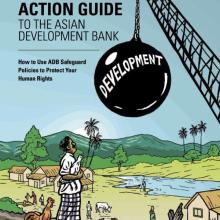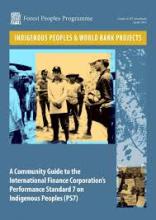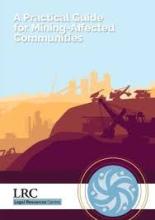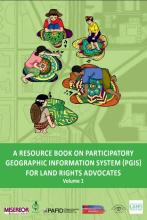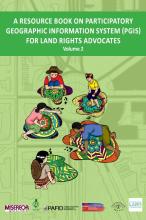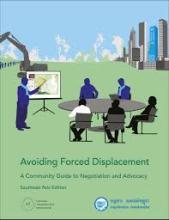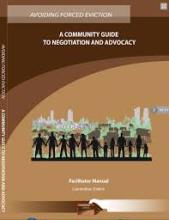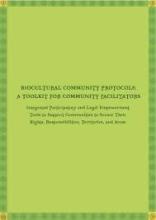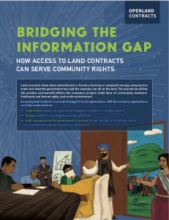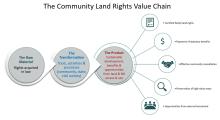Resources for Community preparedness
A Community Guide to the Asian Development Bank: How to Use ADB Safeguard Policies to Protect Your Human Rights
This guide provides a simple yet complete resource to help communities to understand the Asian Development Bank’s policies and use them for justice. While it focuses on the ADB, it also contains information that is useful for any campaign against destructive development—even if the ADB is not involved. The guide contains different kinds of information, including:
• Information about human rights and rights-based development
• Information about the Asian Development Bank and its safeguard policies
• Learning activities for community workshops
• Stories of the impacts of development projects, and ways that communities have defended themselves
• Advocacy tools to defend against destructive projects, to influence ADB plans, and to build campaigns for development justice
• Tips from community activists who have spent many years defending community rights.
A Community Guide to the International Finance Corporation’s Performance Standard 7 on Indigenous Peoples (PS7)
This guide helps communities, community-based organisations and other supporters know what to do if a company is planning to develop projects on or near their customary lands, using a loan from the International Finance Corporation (IFC) – the private sector part of the World Bank Group. This guide is also useful for any projects using loans from other funders or companies that have chosen to follow the IFC’s social and environmental rules.
A Practical Guide for Mining-Affected Communities
This guide seeks to highlight the steps that concerned parties and communities can take to address the challenges that mining poses on communities. It gives communities the tools they need to understand the law that governs mining and to protect their rights. Although it focuses on South Africa, the tools proposed will be relevant for communities facing similar issues in other countries.
This resource is part of the CCSI’s Directory of Community Guidance on Agreements Relating to Agriculture or Forestry Investment.
A Resource Book on Participatory Geographic Information System (PGIS) for Land Rights Advocates (Volume 1)
This guide (volume 1) aims to equip land rights advocates, development practitioners and stallholder farmers and indigenous people’s communities with the necessary knowledge, attitude, and skills on Community Mapping and Participatory Geographic Information System (PGIS). It focuses on data collection, database management, data processing, and analysis for the production of digital maps useful in advancing the land rights agenda of rural communities, particularly indigenous communities and smallholder farmers in Southeast Asia. Thisfirst volume is designed to impart the key concepts of community mapping and the basics of participatory GIS (PGIS), with the view that the application of PGIS technology contributes to (1) securing legal recognition of the indigenous communities over their traditional territories and resources, and (2) for smallholder farmers and landless rural poor to defend their rights to land and the sustainable use of natural resources.
A Resource Book on Participatory Geographic Information System (PGIS) for Land Rights Advocates (Volume 2)
This guide (volume 2) aims to equip land rights advocates, development practitioners and stallholder farmers and indigenous people’s communities with the necessary knowledge, attitude, and skills on Community Mapping and Participatory Geographic Information System (PGIS). It focuses on data collection, database management, data processing, and analysis for the production of digital maps useful in advancing the land rights agenda of rural communities, particularly indigenous communities and smallholder farmers in Southeast Asia. This second volume is designed to impart on the “how-tos” for the production of digital maps useful in advancing the land rights agenda of rural communities, particularly indigenous communities and smallholder farmers in Southeast Asia.
Avoiding Forced Displacement: A Community Guide to Negotiation and Advocacy (Southeast Asia Edition)
This guide aims to help communities develop “interest-based” negotiation skills and understand how to use a range of tools to deal with the power imbalance between them and those trying to take their housing, land and resources. The guide may be useful to communities threatened with eviction as well as communities that are negotiating solutions for evictions already suffered. It encourages communities to develop a negotiation strategy that incorporates advocacy at key points in order to strengthen their position. Communities can use this guide to negotiate and advocate for solutions or alternatives to eviction that improve the lives of the whole community.
Avoiding Forced Evictions: A Community Guide to Negotiation and Advocacy: Participant’s Manual
This guide aims to help communities who face, or have suffered from, evictions by providing guidance on how to prepare for negotiations. Communities can use this guide to negotiate and advocate for solutions or alternatives to eviction that improve the lives of the whole community.
This resource is part of the CCSI’s Directory of Community Guidance on Agreements Relating to Agriculture or Forestry Investment.
Biocultural Community Protocols: A Toolkit for Community Facilitators
The toolkit is intended to support communities to secure their rights and responsibilities and strengthen customary ways of life and stewardship of their territories and areas. It is directed primarily towards facilitators from the communities themselves or from supporting organizations with whom they have long-standing and positive relationships.
Briefing for Grassroots Organizations – Bridging the Information Gap: How Access to Land Contracts Can Serve Community Rights
This note provides guidance for civil society actors and communities on how to access and how to use the information contained in contracts with companies to be able to:
• Understand company and government obligations related to a company project;
• Monitor whether those obligations are being fulfilled;
• Hold companies and the government to account for bad contracts or for failing to deliver on commitments that are important to communities.
CaVaTeCo Technical Guide 1 - Stages of the CaVaTeCo Approach
The Community Land Value Chain (CaVaTeCo in Portuguese) is an approach that can improve tenure security and management of community lands and natural resources in the context of large-scale land investments. This note presents this approach.


